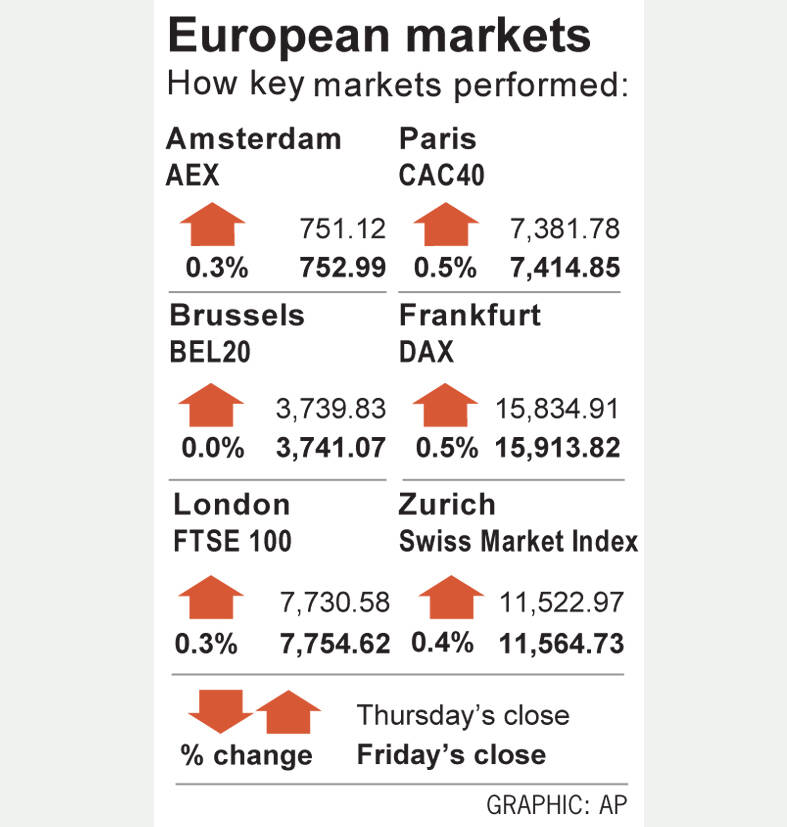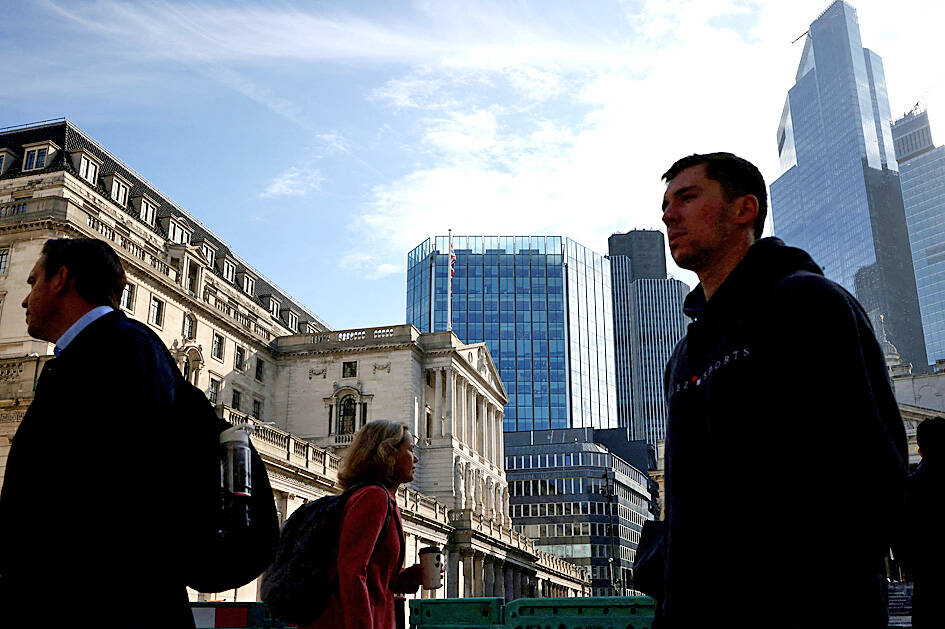Britain’s FTSE 100 on Friday closed higher, with healthcare and energy stocks leading as drugmaker GSK PLC rose, while data showed that the British economy grew slightly in the first quarter of the year.
European shares also rose on upbeat results from luxury major Compagnie Financiere Richemont SA and gains in energy stocks, while investors assessed inflation data from France and Spain for signals about the European Central Bank’s (ECB) plans on interest rate hikes.
The blue-chip FTSE 100 rose 0.31 percent to 7,754.62, snapping a three-day losing streak.

GSK added 1.8 percent after the drugmaker said a Canadian provincial supreme court dismissed a proposed class action against heartburn drug Zantac over increased cancer risk.
A British Office for National Statistics report showed that the economy grew sluggishly early in the year, better than the shallow recession once expected, but an unexpectedly sharp drop in output in March underscored how fragile its recovery remains.
“The GDP [figure] today is not sending out a good signal,” HYCM chief market analyst Giles Coghlan said.

Photo: Reuters
“Even though there’s some confusing input points that allow enough room to overlook this initial print, it will put more pressure on the prints to come,” he said.
British banks recovered from Thursday’s losses, gaining 0.5 percent a day after the country’s central bank lifted borrowing costs.
Morgan Stanley and Bank of America Corp raised their terminal rate forecasts, with both expecting one more interest hike from the Bank of England next month.
Energy stocks rose 0.9 percent, as oil prices rebounded after Thursday’s fall.
The mid-cap FTSE 250 fell 0.4 percent to 19,188.37.
Both London-based indices end the week lower, with the FTSE 100 falling 0.31 percent to log a third straight weekly drop, its longest streak of weekly losses in seven months. The FTSE 250 fell 1.36 percent for the week.
The pan-European STOXX 600 closed 0.4 percent higher at 465.49, gaining 0.04 percent from the previous week.
The benchmark index has traded in a tight range in the past few weeks as investors remain concerned about the possibility of a US recession and further rate hikes from the ECB.
Richemont rose 3.5 percent, after touching a record high in early trading, as the luxury goods group beat expectations after strong demand from Chinese consumers for jewelry and watches boosted net profit and sales in the 12 months through March.
“Luxury is doing very well because the Chinese story is more about domestic recovery, not so much manufacturing. What we’re getting out of China and the way it affects the European market is very uneven,” said Anthi Tsouvali, a multiasset strategist at State Street Global Markets.
“Within Europe, we’re more positive on defensive sectors versus cyclicals,” she said.
Meanwhile, data showed that Spanish national consumer prices rose 4.1 percent in the 12 months through last month, while French inflation rose 6.9 percent — both in line with economists’ estimates.
The ECB’s latest interest rate hike would not be the last as it needs to ensure the current wave of inflation comes to an end, ECB policymaker Deutsche Bundesbank President Joachim Nagel said.

When an apartment comes up for rent in Germany’s big cities, hundreds of prospective tenants often queue down the street to view it, but the acute shortage of affordable housing is getting scant attention ahead of today’s snap general election. “Housing is one of the main problems for people, but nobody talks about it, nobody takes it seriously,” said Andreas Ibel, president of Build Europe, an association representing housing developers. Migration and the sluggish economy top the list of voters’ concerns, but analysts say housing policy fails to break through as returns on investment take time to register, making the

‘SILVER LINING’: Although the news caused TSMC to fall on the local market, an analyst said that as tariffs are not set to go into effect until April, there is still time for negotiations US President Donald Trump on Tuesday said that he would likely impose tariffs on semiconductor, automobile and pharmaceutical imports of about 25 percent, with an announcement coming as soon as April 2 in a move that would represent a dramatic widening of the US leader’s trade war. “I probably will tell you that on April 2, but it’ll be in the neighborhood of 25 percent,” Trump told reporters at his Mar-a-Lago club when asked about his plan for auto tariffs. Asked about similar levies on pharmaceutical drugs and semiconductors, the president said that “it’ll be 25 percent and higher, and it’ll

CHIP BOOM: Revenue for the semiconductor industry is set to reach US$1 trillion by 2032, opening up opportunities for the chip pacakging and testing company, it said ASE Technology Holding Co (日月光投控), the world’s largest provider of outsourced semiconductor assembly and test (OSAT) services, yesterday launched a new advanced manufacturing facility in Penang, Malaysia, aiming to meet growing demand for emerging technologies such as generative artificial intelligence (AI) applications. The US$300 million facility is a critical step in expanding ASE’s global footprint, offering an alternative for customers from the US, Europe, Japan, South Korea and China to assemble and test chips outside of Taiwan amid efforts to diversify supply chains. The plant, the company’s fifth in Malaysia, is part of a strategic expansion plan that would more than triple

Taiwanese artificial intelligence (AI) server makers are expected to make major investments in Texas in May after US President Donald Trump’s first 100 days in office and amid his rising tariff threats, Taiwan Electrical and Electronic Manufacturers’ Association (TEEMA, 台灣電子電機公會) chairman Richard Lee (李詩欽) said yesterday. The association led a delegation of seven AI server manufacturers to Washington, as well as the US states of California, Texas and New Mexico, to discuss land and tax issues, as Taiwanese firms speed up their production plans in the US with many of them seeing Texas as their top option for investment, Lee said. The